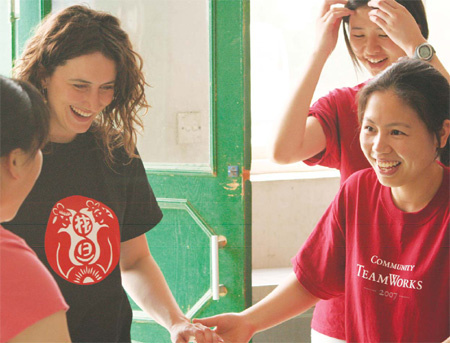Top News
Briton helps migrant women improve self-respect
Updated: 2010-12-17 12:58
(China Daily European Weekly)
British theater expert helps migrant women believe in themselves and survive in a concrete jungle
Dong Fen holds a high school diploma, comes from a poor family and is one of the millions of migrant workers pouring into China's mega cities. When she moved to Beijing her destiny looked grim. Today she is a managing director of a successful non-government organization and is living her dream. The 24-year-old from a remote village of Southwest China's Yunnan province is one of Caroline Watson's success stories.
|
|
When the Hong Kong-born British national arrived in the capital in 2003 she was excited by the city's energy and has lived there ever since. But she was also disturbed to see the formation of a distinct underclass.
"When I first came to China, I was very interested in women's issues and I learnt that many rural women had challenges in the way society treats them," says the 32-year-old.
"I also learnt that, in many situations, the only barriers we have in life are the ones we put up ourselves, we all have to learn how to overcome them. And I've learnt that migrant workers have an energy and dynamism that, I believe, is fueling great change in China.
"It's exciting to work with this group of people."
With the help of sponsorship from various foundations, Watson set up a free acting workshop called Hua Dan, which is China's first nonprofit organization dedicated to empowering migrant women through acting.
The unorthodox program has touched the lives of 14,000 people.
"I studied theater in the UK and learnt how it could be used in community and educational settings," Hua Dan's director says.
"Although I learnt this in the UK, the idea of participatory, community theater is actually common to all cultures around the world.
"Each culture uses storytelling, music, song, dance, theater to share experiences and I wanted to find a way to do more of this in China."
Hua Dan has special meaning in Chinese culture. Dan is the general name for female roles in traditional opera, and Hua Dan refers to the lively and vibrant roles played by young females. "Hua Dan represents a perky, bold and confident woman image of both beauty and wisdom in Peking Opera. We hope every volunteer in our workshop will become a Hua Dan in real life," Watson says.
Since Hua Dan's founding in 2004, Watson says her program has been an important tool to help migrant women gain respect, confidence and a greater sense of self-worth.
Regardless of financial situation and social status, all her students have equal rights in the classroom.
"We focus on human potential development, including the development of confidence, teamwork, leadership, communication, conflict resolution and the ability to think in an innovative way," Watson says. "These are all skills a successful economy needs to have in its people. If you are really going to engage people in an equitable society, you have to make them really understand what they are capable of within themselves."
During a Hua Dan workshop, students stand in a circle and are encouraged to let their imaginations run wild. Each student tells stories, improvises, creates games and role-plays real-life scenarios.
Watson introduced lessons learnt from her own theater classes at Lancaster University in England.
"To do theater and art, it's unnecessary to have formal qualifications. Sometimes people who have studied at formal educational settings are blocked in their thinking," Watson explains.
Dong Fen says many migrant women feel depressed because of economic constraints and a limited social circle and are unable to fight back against unfair treatment.
Some are under huge pressure because they are the only breadwinners in their families.
"Some of them inevitably feel inferior and isolated when they first arrive in the city," Dong says.
"So we sometimes simulate a real working environment and do role plays as a way to inform them of their legitimate rights and how to deal with a wide range of issues, such as discrimination, domestic violence and sexual harassment.
"It's a simple activity, but it's amazing how much it can inspire one's creative expression and build up a great atmosphere in the room where everyone is supporting each other. By the end there's just a whole room of laughing people."
Watson has recruited foreign volunteers with various backgrounds to enhance cross-culture communication skills.
"Thanks to Watson's and the other foreign volunteers' free language coaching, I can now communicate in fluent English and Hua Dan has brought fundamental change in me," Dong says.
"I began to help other migrant women rebuild confidence by using myself as a perfect example," she says. "Everyone deserves a better job, as long as she or he is determined to achieve the goal."
As well as offering workshops to migrant women in Beijing, Hua Dan also runs projects to help children of migrant workers and rural children in quake-hit Sichuan.
"Like how Caroline helps Chinese, Hua Dan may some day help the impoverished women and children in other regions and countries through participatory drama."
"It is easy to feel lonesome in a big city. Learning drama was just a curious attempt to enrich my life. But I didn't know it would divert my life path to a completely unexpected direction later on," she says.
E-paper

Ear We Go
China and the world set to embrace the merciful, peaceful year of rabbit
Preview of the coming issue
Carrefour finds the going tough in China
Maid to Order
Specials

Mysteries written in blood
Historical records and Caucasian features of locals suggest link with Roman Empire.

Winning Charm
Coastal Yantai banks on little things that matter to grow

New rules to hit property market
The State Council launched a new round of measures to rein in property prices.

